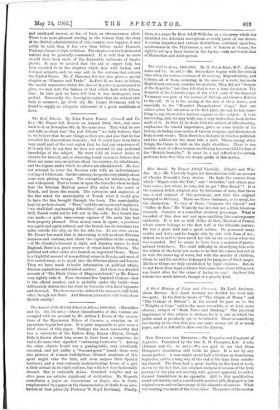The Real Siberia. By John Foster Fraser. (Cassell and Co.
6s.)—Mr. Fraser left Moscow on August 22nd, 1901, and came back to it on November 9th in the same year. That what he saw and tells us about was "the real Siberia" we fully believe; that is, we believe that he saw things as they are, and also that he has recorded his observations honestly ; but it could have been but a very small part of the vast region that he had any experience of. It is only fair to say that he does not pretend to any profound knowledge of the subject. He went with an honest desire to observe for himself, and so observing found reason to believe that there are many misconceptions about the country, its inhabitants, and the regime under which its affairs are administered. He does not attempt to cover the Russian rule with an indiscriminate coating of whitewash. On the contrary, he speaks very plainly about some very glaring wrongs. The corruption, for instance, is deep and widespread. That is borne in upon the traveller when he finds that the Siberian Railway passes fifty miles to the south of Tomsk, and hears the reason. The surveyors and engineers of the line asked the municipality of Tomsk what it would give to have the line brought through the town. The municipality kept its pockets closed. "Then," said the surveyors and engineers, "we shall find engineering difficulties," and they did find them. Still, Tomsk could not be left out in the cold. So a branch line was made,—a quite unnecessary expense if the main lino had been properly planned. Then money came in again ; a pourboire was again and again refused, and the branch has its terminus two miles outside the city, on the far side, too. Ex uno disce omnia. Mr. Fraser has much that is interesting to tell us about Siberian manners and customs, and about the capabilities of the country, —if Mr. Crookes's forecast is right, and America ceases to feed England, there is a great reserve of wheat-land in Siberia. The political and other exiles also furnish an important theme. There is a frightful amount of non-political crime in Russia, and most of it is carted away, so to speak, into the Siberian plains and forests. Then we have much valuable information on political affairs, Russian aspirations and kindred matters. And there is a detailed account of "The Black Crime of Blagovestchensk," as Mr. Fraser very rightly calls it. Four thousand five hundred Chinese—that is the official number, and is probably under the truth—were deliberately driven into the river by Cossacks with fixed bayonets and drowned. The Governor who ordered the massacre still holds office, though not there. And Russian journalists still write about British cruelty !






































 Previous page
Previous page